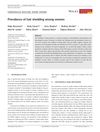17 citations,
June 2003 in “The journal of investigative dermatology. Symposium proceedings/The Journal of investigative dermatology symposium proceedings” Mutations in hKAP1 genes may cause hereditary hair disorders.
 10 citations,
March 2022 in “Communications biology”
10 citations,
March 2022 in “Communications biology” A new non-invasive method can analyze skin mRNA to understand skin diseases better.
 2 citations,
November 2017 in “PloS one”
2 citations,
November 2017 in “PloS one” Some vitamin D analogs can thicken skin and reduce pore size like a common acne treatment, with one analog also affecting skin growth factors.

Ashwagandha-derived nanoparticles can promote human hair growth.
 April 2023 in “Journal of Investigative Dermatology”
April 2023 in “Journal of Investigative Dermatology” Ashwagandha nanoparticles help increase hair growth.
 April 2018 in “Journal of Investigative Dermatology”
April 2018 in “Journal of Investigative Dermatology” The protein DDX6 helps keep skin cells renewing properly by controlling the production of certain other proteins and breaking down those that cause cells to mature too quickly.
 June 2014 in “Journal of biomedical research”
June 2014 in “Journal of biomedical research” Sargassum fusiforme extracts help promote hair growth.
May 2005 in “Molecular Carcinogenesis” mrp/plf-mRNA can indicate tumor-promoting effects in skin.
 September 2022 in “PubMed”
September 2022 in “PubMed” Collagen type XVII α1 decreases with age, leading to skin aging, but targeting microRNA-203b-3p may help maintain its levels and improve skin health.
Hairless mammals evolved quickly in both gene and non-gene areas related to skin and hair.
 44 citations,
September 2019 in “The EMBO Journal”
44 citations,
September 2019 in “The EMBO Journal” Lymphatic vessels are essential for hair follicle growth and skin regeneration.
 42 citations,
July 2021 in “Frontiers in Medicine”
42 citations,
July 2021 in “Frontiers in Medicine” Proxalutamide significantly lowered hospital admissions for male COVID-19 patients compared to a placebo.
 35 citations,
April 2006 in “Ocular Surface”
35 citations,
April 2006 in “Ocular Surface” Cosmetics and procedures can cause eye issues, from mild discomfort to serious conditions, due to allergies, toxins, or poor care.
 29 citations,
October 2020 in “Journal of the European Academy of Dermatology and Venereology”
29 citations,
October 2020 in “Journal of the European Academy of Dermatology and Venereology” Women with high androgen levels may have more severe COVID-19 symptoms.
29 citations,
March 2016 in “Dermatologic therapy” Platelet-rich plasma may successfully treat lichen planopillaris, as shown by one patient's symptom regression.
 12 citations,
September 2018 in “Dermatologic Therapy”
12 citations,
September 2018 in “Dermatologic Therapy” Daily low-dose aspirin lowers minoxidil's effectiveness for hair loss treatment.
 8 citations,
April 2019 in “Dermatologic Therapy”
8 citations,
April 2019 in “Dermatologic Therapy” Tretinoin boosts minoxidil's effect on hair loss by increasing enzyme activity.
 8 citations,
October 2018 in “Dermatologic Therapy”
8 citations,
October 2018 in “Dermatologic Therapy” About 41% of Indian hair loss patients have low enzyme activity that affects hair loss treatment effectiveness, with men affected more than women. Testing for this can guide treatment.
 7 citations,
October 2016 in “Dermatologic Therapy”
7 citations,
October 2016 in “Dermatologic Therapy” About 40% of women without hair loss and 60% with hair loss experience a lot of hair shedding, especially those under 50 with long hair.
6 citations,
December 2017 in “PubMed” Minoxidil helps hair growth by promoting stem cell differentiation through increased ATP synthase activity.
 4 citations,
July 2018 in “PubMed”
4 citations,
July 2018 in “PubMed” Topical minoxidil does not change the activity of hair follicle enzymes that metabolize it.
 3 citations,
July 2019 in “Journal of Cosmetic Dermatology”
3 citations,
July 2019 in “Journal of Cosmetic Dermatology” New shampoo with tyramine hydrochloride reduces hair loss by making a small muscle in the hair follicle contract.
 2 citations,
June 2019 in “PubMed”
2 citations,
June 2019 in “PubMed” A specific enzyme that activates the hair growth medication minoxidil when applied to the skin was identified.
 1 citations,
August 2020 in “Journal of Cosmetic Dermatology”
1 citations,
August 2020 in “Journal of Cosmetic Dermatology” The "After Minoxidil" spray makes hair easier to style, less greasy, and encourages people to keep using the treatment.
 April 2024 in “Liječnički vjesnik”
April 2024 in “Liječnički vjesnik” Modern treatments can effectively regrow hair and improve life for people with alopecia areata.
 February 2024 in “Frontiers in physiology”
February 2024 in “Frontiers in physiology” Lymphatic vessels are important for skin repair and could affect skin disease treatments.

Changes in skin bacteria can affect hair loss and new treatments targeting these bacteria may prevent balding without sexual side effects.
 November 2017 in “Dermatologic Therapy”
November 2017 in “Dermatologic Therapy” A new topical solution safely reduces hair shedding by 38% on average by tightening a muscle in the scalp.
January 2022 in “Stem cell biology and regenerative medicine” Lymphatic vessels help hair follicles regenerate by interacting with stem cells.
 December 2017 in “PubMed”
December 2017 in “PubMed” Society's pressure to have children later in life favors genes that increase the risk of early baldness in male offspring.























